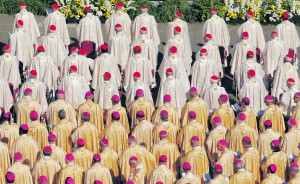by NZ CATHOLIC staff with reports from
CNS
ROME — At the close of the 2014 Synod on the Family in Rome last month, New Zealand Archbishop John Dew said change can seem slow, but the Church must listen to the voices and lives of people who are hurting.
The Extraordinary Synod of Bishops on the Family called by Pope Francis ended on a high note, despite a change of tone in the final report.

Cardinals and bishops attend the beatifi cation Mass of Blessed Paul VI celebrated by Pope Francis in St Peter’s Square at the Vatican on October 19. The Mass also concluded the extraordinary Synod of Bishops on the Family. (CNS photo)
The mid-synod report (relatio) triggered animated debates because of unexpectedly conciliatory language towards people living contrary to the Church’s teaching. However, the final
report toned down the language.
The mid-synod report, described as “earthshaking” by secular media, called for greater acceptance and appreciation of the gifts of Catholics in “irregular marriages”, cohabitating
couples and homosexuals. The final document was considered more obviously grounded in Catholic teaching.
Pope Francis said the disagreements did not mean a fragmented Church.
“Personally, I would have been very worried and saddened if there hadn’t been these temptations and these animated discussions,” the Pope said, “if everybody had agreed or remained silent in a false and quietistic peace.”
Archbishop Dew said he realised how important the discussions on the family were to New Zealanders.
“This is only the beginning of the process. We’re not sure yet what will happen. This time we’re not asked to vote on propositions, and we need to remember that things will not change
overnight,” he said.
“Change in the Church can seem Church not fast, but must listen says NZ archbishop slow at times, but what has been clear is that this discussion is about people’s lives and people are hurting, and if the Church is to be a mother that consoles, encourages, reaches out, supports, it must listen to what is emerging from the discussion,” he added.
 Archbishop Dew said the bishops and cardinals took turns to give their interventions.
Archbishop Dew said the bishops and cardinals took turns to give their interventions.“My own intervention on behalf of the New Zealand Church focused on the need for Church language to be changed so that it gave people hope and encouragement. To find a language
that speaks the truth of the Gospel but in a way that doesn’t make them simply sanctions, but draws people to God,” he said. “We can then propose what we believe the Gospel and the Church
are calling us to as an invitation and a calling, not an imposition.”
He pointed out that terms like “intrinsically evil”, or “irregular situations” are discouraging people from seeing God in their lives.
Archbishop Dew also explained the misunderstanding on the issue of “graduality”. He said some bishops thought they were talking about the graduality of doctrine of faith and morals, when the others were actually talking about the gradual stages of moral growth.
“It [graduality] recognises that none of us are perfect, but we’re all on a journey, so what are we doing to help (or hinder) others on that journey who are often in very difficult and complex family situations?”
Homosexuality was a touchy issue, but Archbishop Dew said the fact it was openly discussed was a huge step in the right direction.
“They were genuinely trying to find a way to recognise those who live a homosexual lifestyle, but were in no way comparing such a union to Christian marriage,” he reported.
Reader Interactions